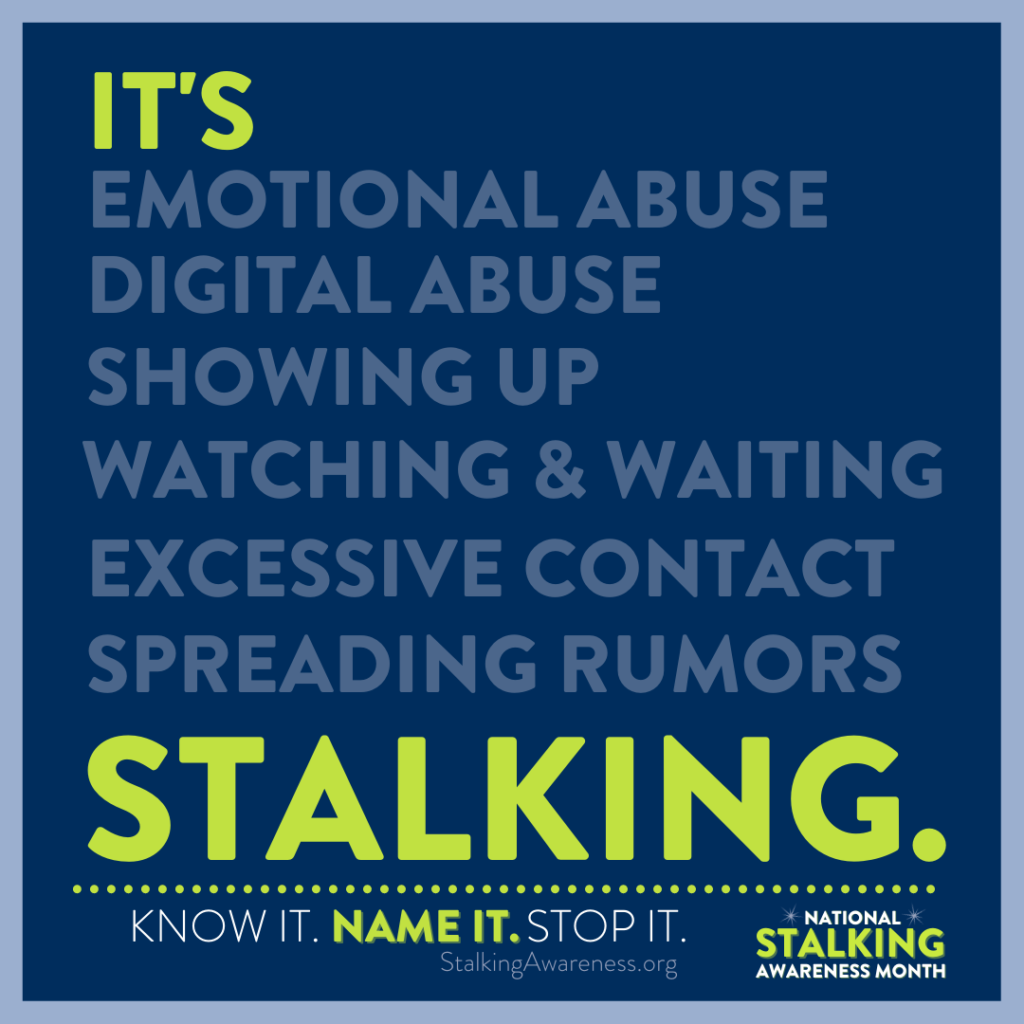
January is National Stalking Awareness Month, and it is so important to know the facts.
For instance, 76% of women murdered by an intimate partner were stalked first.
Stalking generally refers to harassing or threatening behavior that an individual engages in repeatedly, such as following a person, appearing at a person’s home or place of business, making harassing phone calls, leaving written messages or objects, or vandalizing a person’s property. These actions may or may not be accompanied by a credible threat of serious harm, and they may or may not be precursors to an assault.
Stalking is most common after a victim has left the relationship, and women are significantly more likely to be stalked by a spouse or ex-spouse rather than a stranger, acquaintance, relative, or friend. Tactics include:
- making repeated and unwanted phone calls or texts
- sending unwanted letters or emails
- following or spying on you
- showing up wherever you are without a legitimate reason to be there
- driving by or waiting around at places (home, work, school, etc) you frequent
- leaving/sending unwanted items, presents, or flowers for you to find
- posting information or spreading rumors about you on the internet, in a public place, or by word of mouth
- looking through your property (including trash cans, your mail, or your car)
- taking your property
- collecting information about you
- taking pictures of you
- damaging your home, car, or other property
- monitoring your phone calls, email, social media, or other computer use
- using technology, like hidden cameras or GPS, to track you
- threatening to hurt you, your family, friends, or pets
- finding out information by using public records or online search services, hiring investigators
- contacting friends, family, neighbors, or co-workers about you
If you are being stalked, what can you do?
- vary your routine (including using a different bank and grocery store, taking a different route to work and/or school, changing the places you normally frequent)
- not travel alone; use the buddy system as much as possible
- stay in public areas as much as possible
- notify friends/family members/neighbors/landlord/school/day care/coworkers/supervisor about the stalking
- develop a code word to use when the stalker is present or when you’re worried you may be in danger (when you text a friend or family member the code word, they know you need help and they follow a previously outlined plan to get you the help you need- this may involve calling the police)
- increase home security (install deadbolts, window locks or grates, visible security cameras, motion-activated outdoor lights, and/or a home security system)
- make a police report and getting a protective order against the stalker
- block their phone number and block them on social media (and ask your friends to block them/report their account as spam)
- contact your e-mail provider to see if they can block an e-mail address
- change your phone number and e-mail address or create new ones for daily use
- increase internet security on all devices
- check devices for spyware
It is important to save any text messages, emails, voicemails, or letters for documentation purposes, and to keep in mind the possibility that blocking or attempting to block the stalker’s access to you could cause them to retaliate further. After you’ve initially asked them to stop contacting you, it is typically safer to not respond to them.
No one deserves to be abused! Call AVDA at 713-224-9911 or visit avda.org for help.
